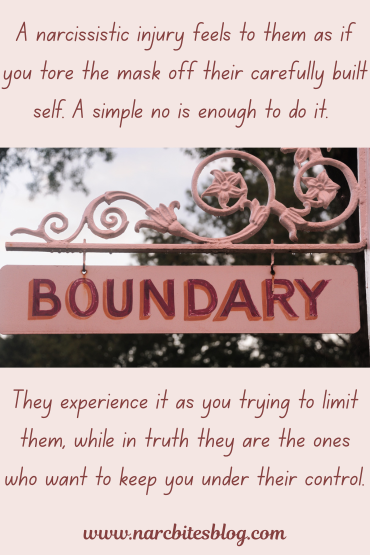Why does a harmless “Please don’t call me after 10 p.m.” feel like an insult to them? Why can “Don’t move my things without asking” sound, in their mind, like you’re trying to control them? Why does saying “I need to rest tonight” get treated as if you just rejected them outright? For a narcissist, even the smallest boundary feels like a personal attack. It’s not about the request itself. It’s about what it represents: you have your own needs, your own limits, and that shatters the illusion that they get to decide everything..
Boundaries as Threats to the False Self
At the heart of every narcissistic personality is the false self—an elaborate mask built to protect a deeply insecure and often developmentally arrested inner world. The false self thrives on admiration, validation, and dominance. Boundaries? They disrupt that ecosystem.
Why? Because boundaries say: “You don’t control everything. I have needs. I have limits. And I’m not afraid to voice them.”
To a secure, emotionally regulated person, this might feel like healthy communication. But to someone with narcissistic traits, it’s psychological warfare. Boundaries shatter the illusion of superiority. They call out entitlement. And worst of all, they force the narcissist to confront their own inadequacies—something they’ve spent a lifetime avoiding.
Childhood Roots: When Autonomy Was a Threat
Many narcissists didn’t start out as emotional tyrants. They were made—not born. Narcissistic personality traits often emerge from early environments where a child’s emotional needs were either neglected or overindulged in ways that prevented the development of authentic self-worth.
Let’s imagine two archetypes:
- The Golden Child: This child is excessively praised, often in place of genuine love or connection. “You’re perfect,” becomes a refrain, but only as long as they perform. Any sign of independence or self-expression that threatens parental control is punished. Boundaries in this dynamic feel like betrayal.
- Invisible Child: This one gets little attention unless they serve a purpose—so they learn to shape-shift, to become what others want. Their own needs are never validated. As adults, they may become narcissists who demand complete emotional access from others because they were denied it themselves.
In both cases, the child never learns that love and limits can coexist. So when someone sets a boundary in adulthood, it resurrects old trauma: the terror of abandonment, the shame of inadequacy, or the rage of being controlled.
Neuroscience and Narcissism
Recent studies in neuroscience support what psychology has long observed: narcissists process emotional stimuli differently. Brain scans show reduced activity in the anterior insula—an area tied to emotional empathy. This means they may understand intellectually that someone has needs, but emotionally, they don’t register or respect them.
Combine that with heightened activity in the reward center (the ventral striatum), and you have a brain wired to seek power and attention while being neurologically unmotivated to respect others’ boundaries.
In some cases, researchers have also noted dysfunction in the prefrontal cortex—the part of the brain responsible for impulse control and reflective thinking. This may explain why narcissists often act on their emotional reactions rather than regulating them. They experience a perceived slight and immediately strike back, without filtering the social cost or emotional fallout.

The Narcissistic Injury: A Deep Wound Reopened
The moment you say “no” to a narcissist, you’re not just declining an invitation—you’re wounding their constructed self. Psychologist Heinz Kohut called this the “narcissistic injury.” It’s the emotional equivalent of tearing off the mask they rely on to function.
That’s why the backlash can be so disproportionate:
Rage: They might explode, deflecting blame with surgical precision.
Gaslighting: They’ll question your reality: “You never said that.” “You’re overreacting.”
Silent treatment: You’ll get punished with absence—a power play disguised as withdrawal.
Smear campaigns: They may recruit others to view you as unstable or cruel.
In all of these, the goal isn’t resolution. It’s reassertion of control.
Why Boundaries Are Unprocessable to Them
At a deep psychological level, narcissists equate boundaries with rejection. You’re not just asking for space—you’re withholding supply. And to them, supply (attention, praise, compliance) isn’t just pleasant. It’s survival.
Without a steady stream of narcissistic supply, they confront what they fear most: the emptiness beneath the persona. Boundaries force that confrontation. And instead of processing it, they attack the source of discomfort—you.
What’s more, boundaries shatter their fantasy that they are the center of your world. This fantasy isn’t just comforting—it’s fundamental. When you introduce a limit, it challenges their omnipotence. They interpret it as a diminishment, as though you are shrinking their importance in your life. And that, to them, is intolerable.
Why You Start to Feel Like the Problem
Over time, narcissistic backlash to boundaries doesn’t just create conflict—it creates confusion. You start to doubt yourself.
- “Maybe I was too harsh.”
- “Am I being selfish?”
- “They had a tough childhood… maybe I should let this slide.”
But here’s the psychological twist: narcissists don’t just ignore boundaries. They erode your internal ones. What starts as an external limit (“Please don’t yell at me”) becomes an internal negotiation (“Maybe I deserved to be yelled at.”)
That’s how emotional abuse works—not always through violence, but through slow, strategic erosion of your sense of what’s fair, what’s real, and what’s yours to protect.
Control as a Coping Mechanism
Understanding why narcissists react this way doesn’t excuse the behavior, but it does demystify it. At its core, narcissistic behavior is a coping mechanism—a maladaptive strategy to manage deep psychological wounds.
Control becomes the only way they feel safe. Your boundary removes that control. So, like a caged animal, they lash out—not because you’re wrong, but because they’ve never learned how to coexist with limits.
And what’s tragic is that the boundary is often meant to preserve the relationship—to make it healthier, safer. But a narcissist doesn’t interpret it as love. They see it as betrayal. So they retaliate, not to restore intimacy, but to restore their dominance.
What Boundaries Represent in Healthy Relationships
Ironically, the very thing narcissists resist—boundaries—is what makes intimacy possible. In healthy relationships, boundaries:
- Clarify expectations
- Promote mutual respect
- Create emotional safety
But to a narcissist, they do the opposite. They:
- Trigger abandonment fears
- Threaten power dynamics
- Force introspection they’re unwilling or unable to do
Because narcissists lack a stable internal sense of self, their identity often relies on external validation. Boundaries, then, are not interpreted as collaboration, but as disconnection. And disconnection, to someone with an unstable core, feels like annihilation.
What to Watch For When You Set a Boundary
When you begin asserting your needs with a narcissist, watch for these red flags:
- Love-bombing followed by guilt-tripping
- “You’ve changed” accusations
- Attempts to hijack the narrative (“You’re the one who’s manipulative!”)
- Conditional affection (“If you really loved me, you wouldn’t need space.”)
These aren’t just annoying behaviors. They’re strategies—designed to make you surrender the boundary you worked so hard to define.
They will also test the boundary repeatedly. Not because they don’t understand it, but because they do. The test is the point: to see if you’ll hold the line or cave under pressure. If you fold, they win. If you hold, they escalate.
Why They’ll Never Thank You for Being Clear
Don’t expect gratitude. Expect resistance. Expect testing. And most of all, expect the blame to land on you.
Narcissists can’t process boundaries as care. They see them as control, critique, or worse—abandonment. So when you draw a line, they’ll often respond like it’s a betrayal. Even if your tone is calm. Even if your words are kind.
Because it’s not about what you say. It’s about what your limit represents: a rupture in their ability to own the narrative.


